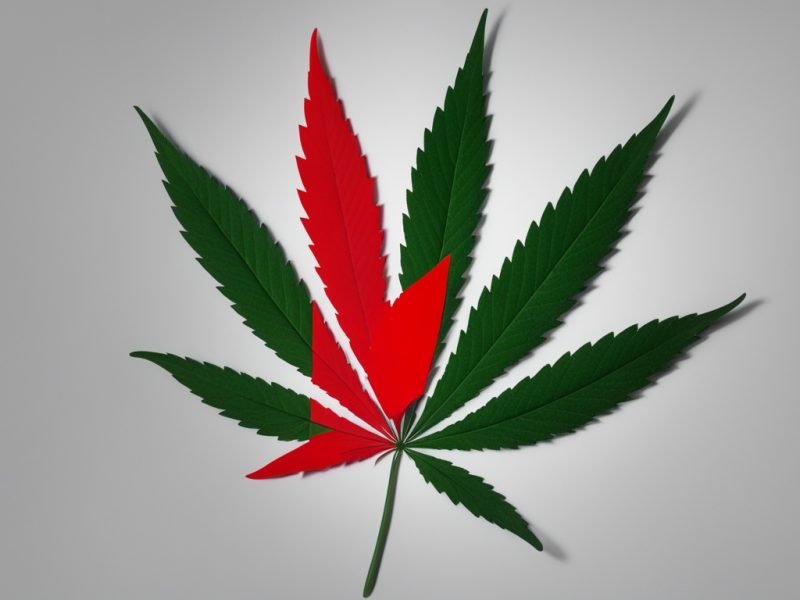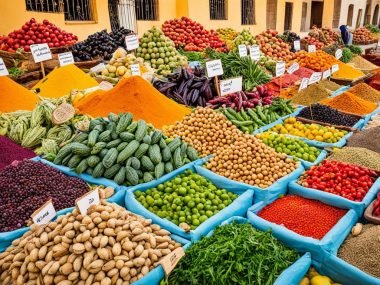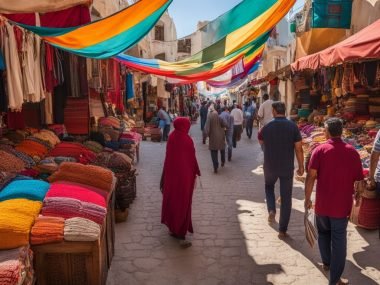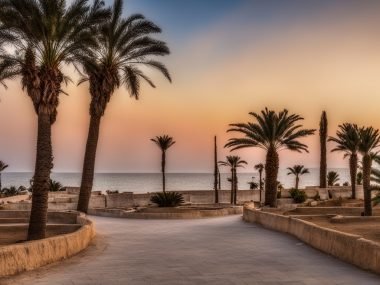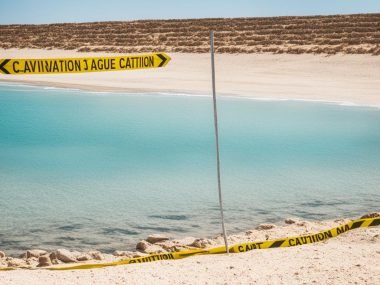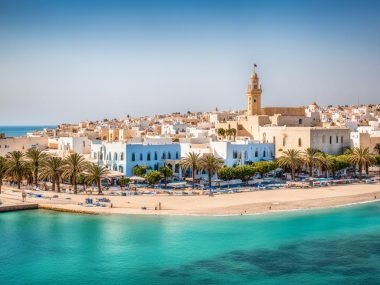In 2020, over 7,450 people got jailed for weed-related crimes in Tunisia. This big number shows how strictly Tunisia follows its cannabis laws. No one is allowed to use weed, whether for fun or health. Cannabis came to the area during the Arab invasions from the 9th to the 12th century. The French started banning it when they ruled, making it official in 1953.
In today’s Tunisia, they use urinalysis to check if someone has used cannabis. If the test is positive, that person can go to jail, even if they don’t have the weed on them. So, if you’re wondering, “Is weed legal in Tunisia?”, the answer is a strong ‘no’. Tunisia’s laws against cannabis are very strict. They don’t allow it for fun or health reasons. This shows the tough stance of Tunisia on drug policy, affecting both locals and visitors.
Key Takeaways
- Over 7,450 people were imprisoned for cannabis-related offences in Tunisia in 2020.
- Cannabis, known as Zatla or Takrouri, was introduced during the Arab invasions from the 9th to the 12th century.
- Prohibition of cannabis was formalised under French colonial rule in 1953.
- Enforcement measures include urinalysis to detect use, leading to imprisonment without possession.
- Both recreational and medical use of cannabis remain illegal under Tunisia’s strict drug policy.
Historical Overview of Cannabis Legislation in Tunisia
The journey of cannabis laws in Tunisia has a long history. It shows how things changed from ancient times to now.
Early Introduction
Cannabis first came to Tunisia between the 9th and 12th centuries. It was brought by Arabs. Known as Zatla, it became part of the culture and medicine.
French Colonial Rule
French rule impacted Cannabis Tunisian Legislation a lot. By 1953, they made a law. It banned growing it and punished those involved with jail.
Post-Independence Laws
After gaining independence, Tunisia kept strict laws. These laws, started by the French, shape today’s rules. They make sure control over cannabis is strong.
Introduction of the 1992 Narcotics Act
The 1992 Narcotics Act’s start was a big moment for Tunisia’s drug laws. It brought strict rules and tough punishments for drug crimes, especially those involving cannabis.
Key Provisions
Key points of the 1992 Narcotics Act, or Law 52, are about controlling and punishing drug crimes. This includes crimes related to cannabis. The Tunisian Weed Regulations created by this act include:
- Mandatory minimum sentences for first-time offenders
- Severe penalties for possession, use, and trafficking
- Strict enforcement through law authorities
Impact on Cannabis Users
The 1992 Narcotics Act Tunisia really changed things for people using cannabis. With required minimum sentences, more people ended up in jail for cannabis crimes. This hard stance shows Tunisia does not tolerate drug use at all. It makes things very hard for cannabis users.
To understand better, let’s look at a comparison:
| Aspect | Before 1992 | Post-1992 Legislation |
|---|---|---|
| Legal Provisions | General drug control laws | Specific and stringent cannabis-related regulations |
| Minimum Sentencing | Varies, often discretionary | Mandatory minimum sentences for first-time offenders |
| Penalty Severity | Moderate | Severe |
| Incarceration Rates | Lower | Significantly increased |
Law 52 and Its Consequences
Law 52 in Tunisia is very strict about cannabis. Since 1992, it has set strict cannabis penalties. If someone is caught with cannabis, they face at least one year in prison even if it’s their first time. Many people around the world have criticized how tough the law is. They say it limits personal freedom too much.
Because of this law, many are in jail in Tunisia. Human Rights Watch says a lot of prisoners are there for breaking the cannabis law. There was a case where three young men got 30 years for just using cannabis. This shows how harsh the law is. It affects many aspects of life in Tunisia.
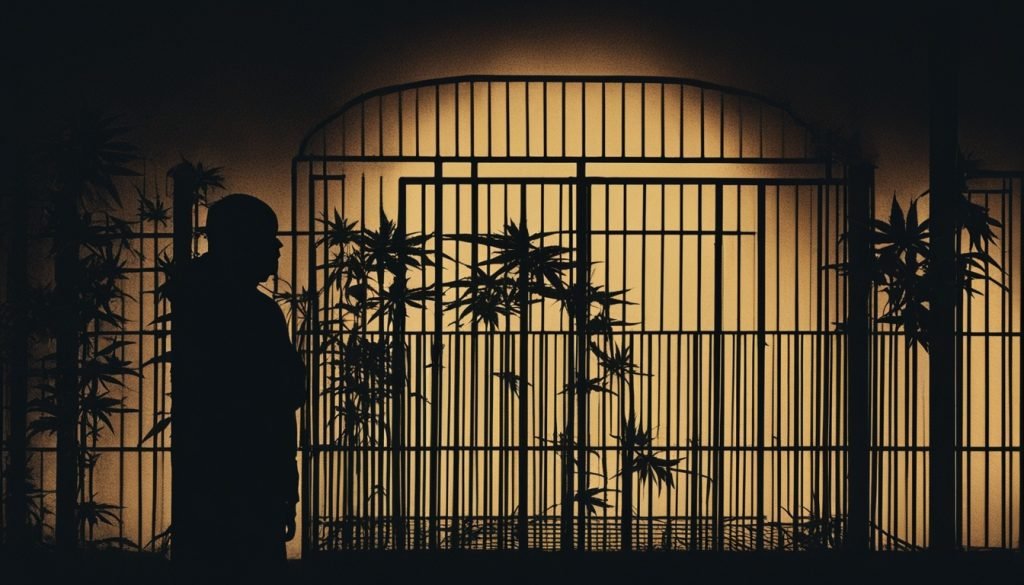
Law 52, or the 1992 Narcotics Act, is very strict indeed. It keeps Tunisia’s tough stance against cannabis. This has made life hard for many people there. They want the law to change, but it’s been hard to make those changes happen. The strict enforcement and heavy punishments continue to cause debates globally.
The law not only makes using cannabis a crime. It also makes Tunisian prisons very crowded. Often, they catch people with tests.
Strict cannabis penalties from Law 52 show Tunisia doesn’t tolerate cannabis at all. The law is enforced strictly, leading to heavy penalties. This creates a lot of fear about using cannabis in Tunisia. The law is often criticized because it is so severe. It shows just how tough prison sentences for weed can be there.
Current Legal Status: Is Weed Legal In Tunisia?
In Tunisia, the law is strict about cannabis. It bans both fun and medical use. People often discuss Tunisia Drug Policy Weed and what it means.
Recreational Use
Using weed for fun is not allowed in Tunisia. If you do, you could get into big trouble. The Tunisia Drug Policy Weed makes it clear: no using weed for fun.
Medical Use
It’s the same for medical weed in Tunisia. Even using CBD for health reasons isn’t allowed. There’s no way to legally use medical marijuana at all.
This table shows how Tunisia treats both fun and medical weed:
| Category | Legal Status | Implications |
|---|---|---|
| Recreational Cannabis Use | Illegal | Severe penalties, including imprisonment |
| Medical Cannabis Use | Illegal | No legal exceptions, strict legal repercussions |
Enforcement of Cannabis Laws
In Tunisia, the law is tough on cannabis. It works hard to stop anyone from using or having it. This way, they make sure everyone follows the strict rules about cannabis.
Role of Law Enforcement
Tunisian police have a big job. They must make sure no one breaks the cannabis laws. They do things like raids and checks to find cannabis crimes. Their main aim is to keep people from using cannabis at all.
Urinalysis and Proof of Use
One key method in Tunisia is using urine tests to find cannabis use. This is important because it catches users without needing to find the drug on them. If the test says someone used cannabis, they can get into big trouble, like going to jail. These tests show Tunisia is very serious about stopping cannabis use.
Along with other police work, using urine tests helps Tunisia find those using cannabis without having it on them. This shows how committed they are to their strict rules on cannabis.
Potential Consequences for Cannabis Use and Possession
In Tunisia, the rules about cannabis are very strict. People caught with it face tough punishments, whether it’s their first time or not. This shows how serious the country is about stopping cannabis use.
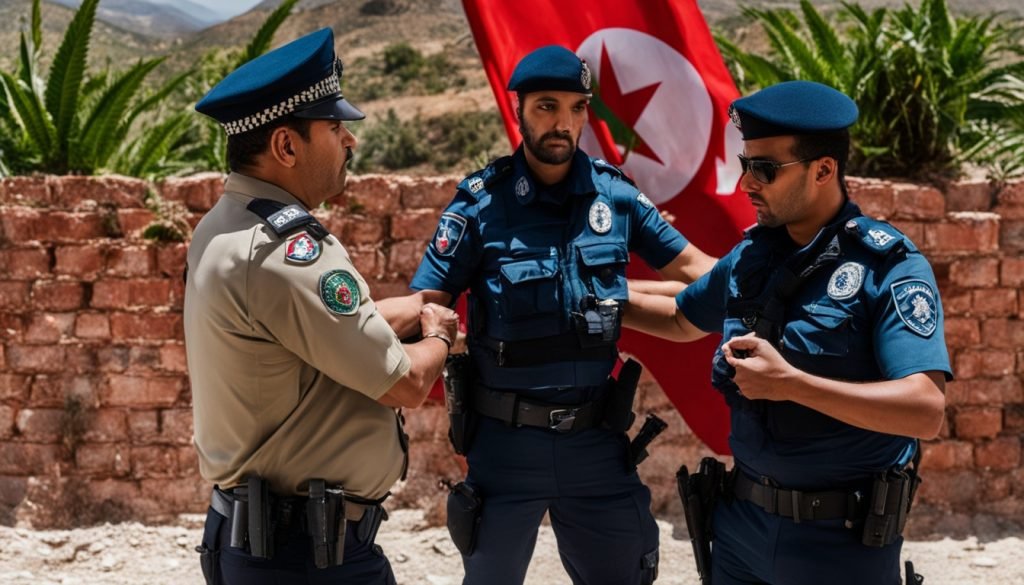
First-Time Offenders
If someone is caught with cannabis for the first time, they get into big trouble right away. They might have to go to jail and pay a lot of money as a fine. This is because Tunisia does not allow any cannabis use at all.
Repeat Offenders
People who break this law more than once get even harsher punishments. They could spend a lot more time in jail. This can really mess up their lives. The law is very clear that it does not go easy on anyone who keeps breaking the rule.
Tourists and Cannabis in Tunisia
If you plan to visit Tunisia, know about the strict cannabis laws first. For tourists, it’s vital to understand the big legal risks tied to using or having cannabis. Despite how tempting Tunisian Cannabis Tourism sounds, the real risks are huge.
Legal Risks
Foreign travellers face tough penalties like locals for any cannabis issues. You could be detained, fined, or sent back home for having cannabis. This risk isn’t just a maybe, it’s the real deal in Tunisia’s no-nonsense approach. Anyone caught with cannabis could face harsh punishment.
Advised Precautions
With the big Legal Risks Weed Tunisia brings, it’s crucial to take Cannabis Precautions for Travellers. Mainly, don’t use or carry any cannabis while there. Doing so could risk your safety and your trip. Also, be careful with locals offering cannabis. The law sees no difference between accidentally having it or using it on purpose.
Cultural Context and Public Perception of Cannabis
Over the ages, the cannabis cultural context Tunisia has been shaped a lot. This happened through traditional use and very tough legal rules. Despite being banned, it has still played a part in local traditions. This is because it arrived with the Arab invasions from the 9th to the 12th century.
Today, how people see cannabis in Tunisia is a mix of many things. These include cultural norms and religious beliefs. Islamic teachings, which usually don’t approve of getting intoxicated, affect this view a lot. As a result, most people tend to view cannabis use negatively.
Seeing how the cannabis cultural context Tunisia clashes with harsh laws reveals a weird mix of contradictions. Even with strict laws, some people still keep cannabis close to their hearts. This often leads to its hidden use. The government tries very hard to stop people from seeing cannabis use as okay. They even use urine tests to catch users.
Religious and cultural views heavily shape how people see cannabis in Tunisia. This leads to a strong move against it through tough laws.
This complex relationship shows how history and today’s laws are at odds over cannabis in Tunisia. Grasping this struggle helps us really understand the nation’s complicated view on cannabis.
The cannabis cultural context Tunisia shows the fight between old ways and new changes in Tunisian society. These views shape current rules and may influence future talks and changes.
Medical Cannabis and Industrial Hemp in Tunisia
Tunisia is talking more and more about medical cannabis and industrial hemp laws. Around the world, people are making progress, but Tunisia is still behind. They don’t have strong laws yet. These plants could be very useful for health and industry. But right now, Tunisia’s laws don’t let that happen.
Lack of Legal Framework
Tunisia doesn’t have good laws for growing or selling medical cannabis and hemp. This makes it hard for the country to benefit economically. There’s no legal system to support new industries using these plants. This lack of rules stops medical studies and care. It also prevents farmers from growing these potentially profitable plants.
Human Rights Activism and Reform Efforts
Human rights supporters in Tunisia want to change the laws about cannabis. They are working hard, even when it’s tough, because current laws are too strict. They want the country to see how legal cannabis and hemp can help. They believe new, fair laws can bring economic growth.
| Aspect | Current Status | Potential Benefits |
|---|---|---|
| Medical Cannabis | Prohibited | Therapeutic use, pain management |
| Industrial Hemp | Prohibited | Economic opportunities, sustainable agriculture |
| Cannabis Reform Efforts | Ongoing Activism | Legal clarity, human rights protection |
Potential for Legal Reform
In Tunisia, people are talking more about legal reform cannabis Tunisia. This talk is powered by human rights groups and global attention. Decriminalisation efforts Tunisia are key to change, even though it’s hard.
Supporters say current laws unfairly affect young and marginalised people. Big changes need new ways of thinking in laws and how people think. But, there are many hurdles like old cultural and religious beliefs.
Making changes to legal reform cannabis Tunisia is tough. It’s hard because of slow politics and strict drug laws. Still, we see small steps forward as talks happen in government.
To really get decriminalisation efforts Tunisia, we must see it from all sides. It takes lots of planning and dedication by those pushing for it.
| Factors | Challenges | Opportunities |
|---|---|---|
| Legislative Change | Inertia, rigid laws | Human rights advocacy, international pressure |
| Societal Acceptance | Cultural and religious convictions | Rising awareness, youth movements |
| Judicial Reforms | Historic rigidity | Discussion forums, progressive judicial voices |
The journey might be slow with many against it, but the conversation on legal reform cannabis Tunisia and decriminalisation efforts Tunisia brings hope. It shows we may see kinder laws for cannabis in Tunisia soon.
Conclusion
Looking at cannabis rules in Tunisia shows a tough ban enforced by strict laws. It’s key to know the history and politics behind these rules. This knowledge is vital for those exploring Tunisia’s cannabis scene.
The 1992 Narcotics Act in Tunisia is very strict. It shows the country’s no-tolerance policy. This is important to remember.
Culture and religion greatly shape how people in Tunisia see cannabis. Despite changes around the world, Tunisia stands firm in its rules. This results in strict control, little chance for change, and big penalties for rule breakers.
While many places are easing up on cannabis, Tunisia is sticking to its strict ways. The outlook for change in Tunisia’s cannabis laws isn’t very hopeful right now. However, some are fighting for change. It’s crucial to understand these strict laws to really get the picture of Tunisia’s stance on cannabis.

